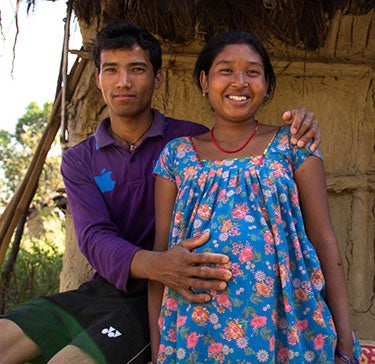Empowerment of women has been a theme throughout the Global Maternal Newborn Health Conference (GMNHC). Without the ability to choose and access the care she needs, a woman’s wellbeing and health is compromised. While it’s easy to speak of empowerment, how do we actually increase it?
 One solution was proposed in a GMNHC session on group antenatal care (ANC). For many women, pregnancy can be isolating and ANC can be a burden, especially in low-resource settings. Wait times for visits are long—sometimes many hours—and a woman may only see her health care provider briefly, without receiving all the information she needs. “Content-free contact” means a woman will either not get the care she actually needs from the visit, or will have to return several times, requiring more than the four recommended by the WHO.
One solution was proposed in a GMNHC session on group antenatal care (ANC). For many women, pregnancy can be isolating and ANC can be a burden, especially in low-resource settings. Wait times for visits are long—sometimes many hours—and a woman may only see her health care provider briefly, without receiving all the information she needs. “Content-free contact” means a woman will either not get the care she actually needs from the visit, or will have to return several times, requiring more than the four recommended by the WHO.
Group ANC is a model that brings together a health care provider, usually a midwife, and a group of women in the same stage of pregnancy to receive care. This model of care solves several problems. It allows a provider to have up to two hours with a group of patients, providing rich content that is driven by the needs of the women, not the objectives of the provider. It also helps form a peer support group for a woman throughout her pregnancy and the postpartum period, reducing feelings of isolation. Also, group care is scheduled, allowing women predictable appointments and time for the midwife to prepare content-rich sessions.
Several models in different settings were presented at GMNHC, all with evidence of empowerment for women and their families.
In Ethiopia, a cross-sectional study showed that women were only getting 32% of the required medical services from antenatal through postnatal care. To help improve the care provided to women, researchers from Emory University evaluated three different models of delivering ANC:
- traditional visits,
- ANC visits supplemented with home-based education for the pregnant woman, or
- ANC visits supplemented with home-based education for the whole family.
For home-based education, community health extension workers did home visits to register pregnant women for ANC and provide either individual or family-based pregnancy and childbirth education based on American College of Nurse Midwives’ Home-Based Life Saving Skills program.
ANC coupled with family-based education was the only model that had a significant impact on the care pregnant women receive. With this model, skilled birth attendance increases, women receive nearly 90% of recommended care and a woman is more likely to receive postnatal care within 48 hours of birth, an aspect of care that usually has very poor coverage .
Aynalem Hailemichael, senior facility quality improvement advisor with the Maternal and Newborn Health Ethiopia Partnership of Emory University, noted that family-based education empowers families to recognize warning signs so women can get the care they need. “To empower women, sharing information is very important in utilization of services: that’s how we know with skilled delivery, [that the] more the family knows, the more they can utilize the services,” said Hailemichael.
CenteringPregnancy, a well-known group-based ANC platform from the United States, recently started implementation in other parts of the world. This model gives pregnant women agency in their own care, with the group collectively guiding the content of the sessions and each woman collecting her own health information.
A pilot study recently completed in Tanzania and Malawi showed significant improvement in three areas: empowerment, satisfaction and health pregnancy knowledge. One participant commented that she now knew what the numbers meant on her card (likely blood pressure), because she was included in all aspects of her care, in contrast to provider-driven care.
However, group care is not a cure-all. “These quality interventions are not ways to cut corners in care, don’t look to this as something that is going to be a cost-saver necessarily or a way to cut corners in a clinic,” said Jody Lori, associate professor at the University of Michigan School of Nursing.
Implementing group care takes time and investment from all levels of the health care system. “It is important to work with the ministries from the local to national level, to have ongoing feedback. I think government involvement is important for equity and scale,” said Sheela Maru, instructor at Boston Medical Center and global women’s health fellow at Brigham and Women’s Hospital.
“Group care is disruptive innovation,” said Carrie Klima, clinical professor and program director of the Nurse Midwifery and Women’s Health Nurse Practitioner Programs at University of Illinois, Chicago. Group-based ANC allows women to get the care they need, in a supportive and respectful setting. It empowers them to make healthy decisions for themselves and their pregnancy by allowing them to drive the content of their care and be more informed.
Photo: David Wardell/Save the Children
